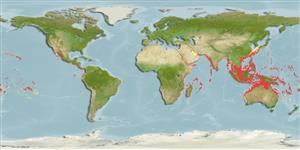Preferred temperature (Ref.
115969): 23.2 - 29, mean 27.9 (based on 2624 cells).
Phylogenetic diversity index (Ref.
82804): PD
50 = 0.5000 [Uniqueness, from 0.5 = low to 2.0 = high].
Bayesian length-weight: a=0.01778 (0.01459 - 0.02168), b=2.95 (2.92 - 2.98), in cm Total Length, based on LWR estimates for this species (Ref.
93245).
栄養段階 (Ref.
69278): 4.5 ±0.8 se; based on diet studies.
回復力 (Ref.
120179): 手段, 1.4年~4.4年の倍増期間の最小個体群 (K=0.23; tm=2; Fec=49,700).
Prior r = 0.69, 95% CL = 0.45 - 1.03, Based on 3 data-limited stock assessments.
Fishing Vulnerability (Ref.
59153): High vulnerability (56 of 100).
Climate Vulnerability (Ref.
125649): High to very high vulnerability (75 of 100).
